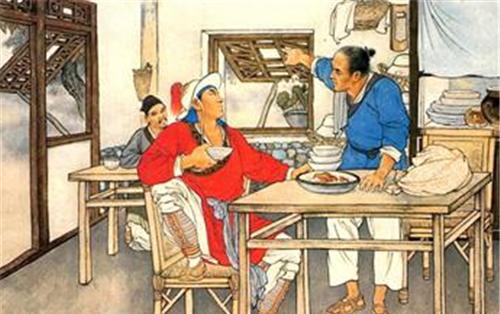Readers who have watched "Water Margin" will have such a concept, a large bowl of drinking wine and eating meat is the most yearning life in the hearts of these heroes and good men, and the biggest chip for beckoning others to go up the mountain is to drink wine and eat meat without scruples. Wu Song was under the Jingyang Gang, and he was also two pounds of cooked beef plus eighteen bowls of good wine, and he dared to break into the tiger's den after eating and drinking enough. In the book, various meats seem to be the dishes of hotel inns, but was eating meat really so casual in ancient times?

The history of poultry rearing in China dates back to prehistoric civilization, when humans began raising poultry and using them as one of their main food sources. The "Zuo Zhuan" records that "the six animals of the ancients are not used together", that is, the six types of animals raised in ancient China are "horses, cattle, sheep, dolphins (pigs), dogs, and chickens", which are also the most common meat foods on the table of the ancients, but in different historical periods, eating meat also has special taboos.
During the Shang and Zhou Dynasties, the consumption of meat even became an important part of the liturgical system, and in order to distinguish the hierarchical concept of commoners and nobles, it was stipulated that only nobles above the scholar class could eat meat, and commoners could only be simple vegetarians. The "Chinese" records that "the Son of Heaven eats too fast, the cattle and sheep are complete, the princes eat cattle, the Qing eats sheep, the doctor eats the pig, the soldier eats the fish, and the people eat vegetables." ”
In the Spring and Autumn Warring States period, the cooking method of meat has been very mature, "Western Zhou Eight Treasures" is the main production method of meat food in the Central Plains in this period, these inherited from the Customs of the Western Zhou Cuisine is very cumbersome, such as the "cannon dolphin" is to slaughter the piglets after layers of feeding and cooking, plus reeds, mud, porridge and other foreign objects to increase the taste, but also to prepare special sauces, cooked for three days and three nights. In China thousands of years ago, there was such a gastronomic cooking concept, which shows that people have attached great importance to meat cuisine.
Although the traditional system of ritual music collapsed, the restrictions on the prohibition of civilians from eating meat were also relaxed. However, because of the frequent wars and the small-scale peasant economy began to develop, livestock became an important means of production for ordinary families, and they could not afford to eat meat at all, and there was also the words in the Book of Poetry, "He gentleman is a gentleman, not a vegetarian meal", to ridicule the resentment that the nobles eat meat and can only eat vegetarian food.
After the Han Dynasty, meat has become a common food on the people's table. But because of the development of social production, some animals have also become banned from eating. Like cattle. In the Han Law, there is a stipulation that "few teeth shall not be slaughtered", because cattle are the most important productive force under agricultural civilization, so the government prohibits the consumption of beef by the people in order to prevent the reduction of cultivated cattle. During the Song Dynasty, the slaughter of cultivated cattle was even more included in the code, so the so-called liangshan good man often ate beef.
All dynasties and dynasties have forbidden meat to eat, and when Emperor Wu of the Han Dynasty was in short supply of warhorses against the Xiongnu, he ordered that horses should not be slaughtered, and also set up a special horse administration for management. There is also a similar stipulation in the "Tang Law Neglect Discussion": "Horses are for the army, so the killers are apprenticed for one and a half years." Therefore, in wartime, horses are also very precious strategic materials, and eating horse meat is a very big taboo.
So now we should be glad to be able to taste all kinds of mountain treasures and seafood, if we really travel back to ancient times one day, I am afraid that if we are not careful, we will be troubled from our mouths.